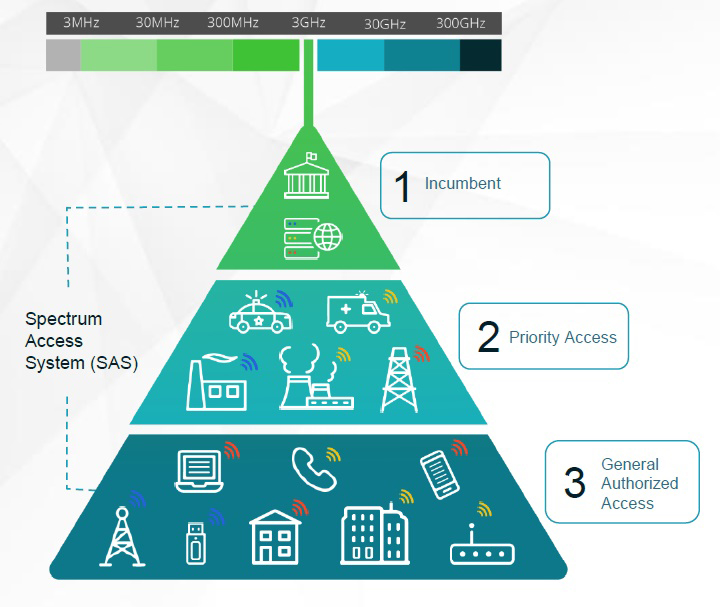FCC Approves Framework for CBRS Band Auction

The smarter way to stay on top of the multichannel video marketplace. Sign up below.
You are now subscribed
Your newsletter sign-up was successful
The FCC voted Friday (Feb. 28) to establish the rules for a competitive auction of spectrum in the 3.5 GHz band, yet another step in the FCC's race to 5G.
The vote was unanimous and drew praise from some quarters for the compromise decision to change the draft proposal to limit the licenses auctioned to county-sized, rather than bundle them into larger CMA (cellular market areas), which could have favored larger players.
Related: FCC Says 5G Services Are Good to Go
The auction is scheduled to begin June 25 and features the most licenses ever up for bid in a single auction--22,631.
Commissioner Michael O'Rielly, who was the point person on the item, addressed the license compromise in his statements from the dais.
"[W]e decided not to pursue the option of CMA-level bidding packages, as previously proposed," he said. "While I remain unconvinced by the arguments against it, I must take into account the views of all the potential bidders. Declining to pursue package bidding here should help calm the waters for any remaining complainers, without altering auction participation or results."
Commissioner Jessica Rosenworcel, who is more often critical of the FCC Republican majority's spectrum-clearing approaches and timetables, had some encouraging words before adding the sting in the tail.
The smarter way to stay on top of the multichannel video marketplace. Sign up below.
Related: Charter Moving Fast on CBRS
She called the vote "a major milestone in United States spectrum policy," and "a radical—a framework for sharing that can turn spectrum scarcity into abundance. That’s very cool."
The sting was that she said the FCC had been hemming and hawing instead of acting and that the moment was bittersweet because it should have happened a lot sooner.
The item approved Friday:
1. "Adopts an ascending clock auction format in which bidders indicate their demand for generic license blocks in specific counties as prices increase (licensees will be dynamically assigned a specific channel by frequency coordinators known as Spectrum Access Systems);
2. "Permits bidding on a county-by-county basis, and allows bidders to bid for no more than four generic blocks of spectrum per county;
3. "Incorporates for the first time in a Commission spectrum auction an “activity upper limit” to mitigate the possibility of a bidder losing bidding eligibility in certain circumstances; and
4. "Adopts bidding credit caps of $25 million for small businesses and $10 million for rural service providers, as well as a $10 million cap on the overall amount of bidding credits that a small business bidder may apply to winning licenses in smaller markets."
The FCC voted 3-1 along party lines Oct. 23, 2018, to change the rules on licenses for the 3.5 GHz (Citizens Broadband Radio Service) band to make it more attractive for providers of 5G, which includes cable ops looking to up their mobile broadband game. The change was billed as a way to spur investment in the band and promote more efficient use, including for 5G.
NCTA-The Internet & Television Association, praised the move, but wanted more.
"NCTA also welcomes the adoption of auction procedures for the 3.5 GHz band that embrace bidding on right-size licenses to set Auction 105 up for success," it said. "We urge the Commission to turn its attention now to the mid-band pipeline for unlicensed use, and look forward to near-term action on the 5.9 and 6 GHz bands.”
It was at the prodding of House Energy & Commerce Committee Chairman Frank Pallone (D-N.J.) at an FCC oversight hearing that prompted chairman Ajit Pai to signal fines were coming. The congressman was glad the fines were being proposed, he was not happy with the amounts.
“Today’s notice by the FCC confirms what I have said from the beginning — carriers have a duty to protect consumers’ real-time location data and the FCC must enforce the law in order to protect the personal safety of consumers across the country," he said. "While I am glad the FCC is finally proposing fines for this egregious behavior, it represents little more than the cost of doing business for these carriers. Further, the Commission is still a long way from collecting these fines and holding the companies fully accountable. I will continue to closely monitor this important issue.”
“We applaud the FCC for continuing to move forward with making this mid-band spectrum available for commercial use," said AT&T executive VP Joan Marsh. "The Commission is to be commended for working collaboratively across government agencies and the wireless industry to develop a unique spectrum sharing solution that accommodates government incumbents while permitting new licensed and unlicensed users.”
Contributing editor John Eggerton has been an editor and/or writer on media regulation, legislation and policy for over four decades, including covering the FCC, FTC, Congress, the major media trade associations, and the federal courts. In addition to Multichannel News and Broadcasting + Cable, his work has appeared in Radio World, TV Technology, TV Fax, This Week in Consumer Electronics, Variety and the Encyclopedia Britannica.

